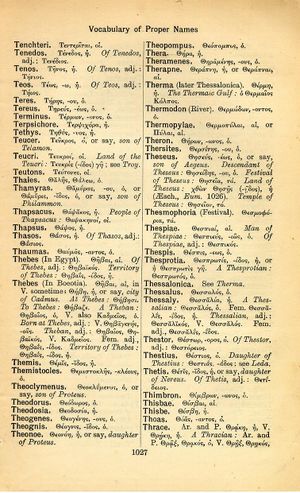Theopompus
καλῶς γέ μου τὸν υἱὸν ὦ Στιλβωνίδη εὑρὼν ἀπιόντ' ἀπὸ γυμνασίου λελουμένον οὐκ ἔκυσας, οὐ προσεῖπας, οὐ προσηγάγου, οὐκ ὠρχιπέδισας, ὢν ἐμοὶ πατρικὸς φίλος → Ah! Is this well done, Stilbonides? You met my son coming from the bath after the gymnasium and you neither spoke to him, nor kissed him, nor took him with you, nor ever once felt his balls. Would anyone call you an old friend of mine?
English > Greek (Woodhouse)
Θεόπομπος, ὁ.
Latin > French (Gaffiot 2016)
Thĕŏpompus,¹³ ī (θεόπομπος), m.,
1 historien de Chios, disciple d’Isocrate : Cic. de Or. 2, 57 ; 3, 36 || -pēus ou -pīus a, um, de Théopompe : Cic. Or. 207 ; Att. 2, 6, 2
2 un partisan de César : Cic. Att. 13, 7, 4 ; Phil. 13, 33 || personnage en relations avec Cic. : Cic. Q. 1, 2, 9 ; 2, 12, 4.
Latin > German (Georges)
Theopompus, ī, m. (Θεόπομπος), I) ein berühmter griech. Geschichtschreiber aus Chios, Schüler des Isokrates, Cic. Brut. 66; de or. 2, 47. Nep. Alcib. 11, 1: Plur. Theopompi, Männer wie Th., Cic. de or. 2, 94. – Dav. Theopompēus od. Theopompīus, a, um, theopompëisch, des Theopompus, mos, Cic. or. 207: genus dicendi, Cic. ad Att. 2, 6, 2. – II) ein Anhänger Cäsars, Cic. ad Att. 13, 7, 4; Phil. 13, 33. – III) ein Anhänger Ciceros in Asien, Cic. ad Q. fr. 1, 2, 3. § 9 u. 2, 12, 4.

